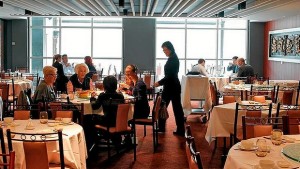Once again, Australian diners are barfing because chefs think they know better about Salmonella in eggs.
 The South Bank Surf Club in Brisbane was inspected after complaints from diners who had confirmed cases of food poisoning.
The South Bank Surf Club in Brisbane was inspected after complaints from diners who had confirmed cases of food poisoning.
Restaurant management told The Courier-Mail that Queensland Health and Brisbane City Council had contacted the business after several sick people came forward.
The manager said the cause had been identified as “a bad batch of eggs’’ provided by a supplier. They said the eggs had been used in sauces served with seafood platters.
“We’ve been caught out, unfortunately. Our customers’ wellbeing is our priority and anyone with concerns can get in touch with us,” they said. “To rectify the problem, we are not making sauces in-house.’’
This is something I wrote for the local paper a few months ago.
In 2013, at least 50 people, mainly children, were sickened with E. coli O157 at the Ekka. Scientific or public follow-up? Nothing.
Queensland Health has been warned repeatedly about Q-fever outbreaks at the Ekka related to the birthing of goats. Follow-up? Nothing.
In 2013, at least 130 people, including 55 nursing home patients were stricken by Norovirus in Ipswich and on the Sunshine Coast. Follow-up? Nothing.
In Nov. 2013, at least 220 people were felled by Salmonella and one was killed at Melbourne Cup functions, all linked to raw egg based dishes served by Piccalilli Catering. Follow-up? Nothing. (I even wrote to then health minister Lawrence Springborg; no response, guess he was busy with parliament).
In Jan. 2015, at least 130 diners were stricken with Salmonella after dining at Brisbane’s Chin Chin Chinese Restaurant. Dozens were hospitalized. Follow-up? Nothing.
In March, 2015, 250 teachers were stricken with Salmonella at a conference, and an additional 20 people were sickened on the Gold Coast from the same egg supplier. Follow-up? Nothing.
As a food safety professor in Canada and the U.S. who relocated to Brisbane four years ago to support my French professor wife, I look at these outbreaks and wonder: what does Queensland Health do? What does Safefood Queensland do?
I believe in science, however fallible it may be, and my church is the (ice) hockey arena.
I also believe in public disclosure, especially because these investigators are working on the Queensland tax dollar. These are hopelessly ineffective agencies — and I’ve seen a lot of agencies — but these are the worst, especially in terms of public disclosure.
 Not the people, but the structure and confines in which they work for a pay cheque.
Not the people, but the structure and confines in which they work for a pay cheque.
Now we’re told that hundreds of Brisbane restaurants, cafes, bakeries and caterers are operating below legal safety standards.
Brisbane City Council says it is waging war on shoddy operators in light of a massive jump in food poisoning outbreaks.
That’s a war of attrition.
Instead, Brisbane, and Queensland, could make a few simple changes to hold the purveyors of food accountable.
Mandate training.
Make restaurant inspection disclosure mandatory instead of the current voluntary.
And create a culture that values microbiologically safe food (the kind that doesn’t make you barf).
I was coaching an (ice) hockey game at the Gold Coast on the weekend, and the restaurant we went to afterwards was advertising a petting zoo – at the restaurant.
This is a microbiologically horrible idea.
Same with the petting zoos at kids’ schools and in malls, like the one in Fairfield.
Queensland is on track to suffer its worst year on record for salmonellosis, which has infected more than 2,500 people – mostly in the southeast – since the start of the year.
The state is also recording spikes in other gastrointestinal illness cases such as Campylobacter (1,993), cryptosporidiosis (604) and yersiniosis (180).
Data from the council’s Eat Safe star-rating system, shows almost 10 per cent of Brisbane’s 6000-plus food operators were operating below legal safety standards.
Queensland taxpayers deserve answers to some basic questions about all of the aforementioned outbreaks:
- How did the outbreak happen;
- was this commodity sourced from a food safety accredited supplier;
- did handling by the caterer contribute to this outbreak;
- what is Queensland Health’s policy on use of raw eggs in dishes to be consumed raw;
- is this policy enforced;
- is the investigation closed and if so, why and when was it closed;
- will an outbreak investigation report be created and publicized;
- why was the previous update erased from the Department’s website and on whose authority; and,
- what is Queensland Health’s policy on providing information to the public.
This isn’t CSI, with its groovy UV lights that make great television but lousy science.
This also isn’t rocket surgery: publicly release all surveillance data on raw eggs in Queensland (or Australia), publicly release the menu items at the Queensland Convention Center and the Grocer and Grind on the Gold Coast where two of their own chefs got sick, and tell chefs to stop using raw eggs in dishes they have to so expertly craft from scratch like aioli or mayonnaise.
This is nothing new and we have been documenting the problem for years because it is a global food safety embarrassment. The solutions are there. It’s time for leadership.
A table of Australian egg outbreaks is available at https://barfblog.com/wp-content/uploads/2015/10/raw-egg-related-outbreaks-australia-10-9-15.xlsx

